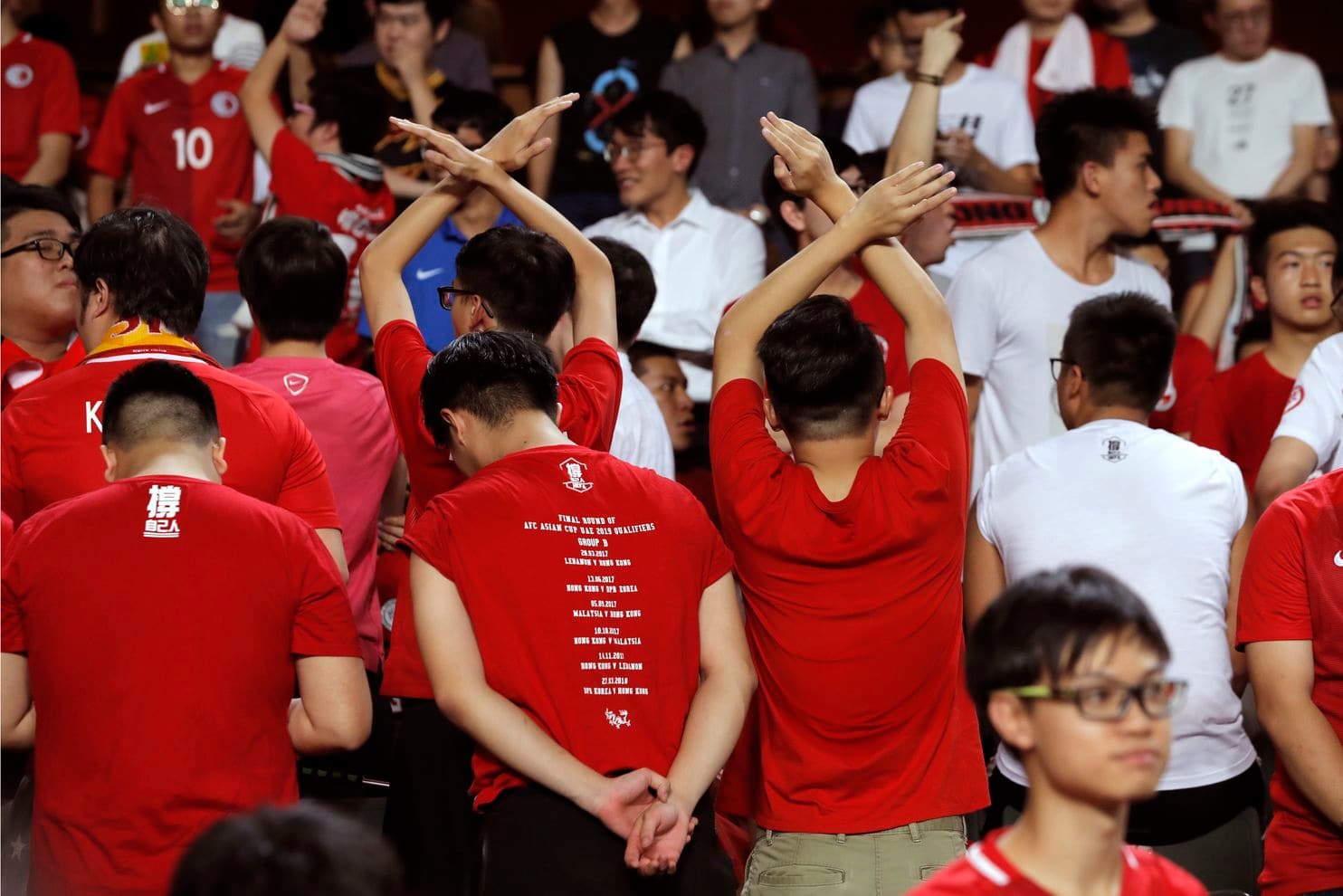Joshua Wong is the secretary general of Demosisto, a political group that advocates for self-determination in Hong Kong. He was one of the leaders of the 2014 Umbrella Movement. Jeffrey Ngo is the chief researcher for Demosisto.
HONG KONG — Speaking at a campaign rally in Alabama two years ago, President Trump made a shocking reference to Colin Kaepernick, the former San Francisco 49ers quarterback who protested racial injustice by sitting and later kneeling during the U.S. national anthem. “Wouldn’t you love to see one of these NFL owners,” said the president, “when somebody disrespects our flag, to say, ‘Get that son of a bitch off the field right now, out. He’s fired. He’s fired!’”
Trump later declared in an interview that any NFL player who followed suit either “shouldn’t be playing” or “shouldn’t be in the country.” But the rebuke seemed to backfire. Since then, more American athletes, not just in football, joined the movement to defend their freedom of expression.
Here in Hong Kong, such actions could now land you in jail for up to three years, in the likely scenario that the troubling National Anthem Ordinance, unveiled last week by the local government, is passed. It mandates that the Chinese national anthem be “played and sung in a way that is in keeping with its dignity” and not be used as “background music in a public space.” A person who “alters the lyrics or score” of the song or even performs it “in a distorted or disrespectful way” may also face criminal charges.
The measure also instructs Hong Kong’s Communications Authority to increase its broadcast of the Chinese national anthem on radio and television and directs the education secretary to make teaching the anthem a core part of school curricula. This recalls a similar effort by Beijing to institute patriotic education in Hong Kong in 2012, which was withdrawn amid massive youth demonstrations. Once again, we’re prepared to take to the streets and oppose the same kind of political indoctrination as the bill moves forward.
At its heart, the proposed legislation is imposing Chinese nationalism on Hong Kongers. But the anthem in question, “March of the Volunteers,” is in Mandarin rather than Cantonese, the official spoken language in Hong Kong. In addition, most people here can’t relate to the song’s themes of a violent communist revolution and a call for so-called pan-Chinese unity. Forcing us Hong Kongers to display a non-existent emotional connection comes at the expense of our own identity, which has been defined against that of China ever since the Cold War. Our identity has been distinguished by freedom on our side of the Bamboo Curtain and authoritarianism on the other; prosperity here and poverty there; peace and stability here and fierce political upheaval there.
The bill is largely in response to the fact that since 2015, in the wake of the Umbrella Movement pro-democracy protests, local soccer fans have repeatedly booed the anthem while turning their backs to the Chinese flag. The ordinance specifically mentions “major sporting events” among the occasions to which the new rules will apply. But the bill is filled with vague clauses, leaving it open to interpretation and potential abuse. What will happen to people who sing the wrong lyrics or even mispronounce words by mistake? Must we all be prepared to stand straight wherever and whenever we hear the music in public to avoid the next video camera catching us being “disrespectful”? How is it possible to judge what amounts to deliberate impertinence?
Beijing says it looks for “solemnity” — the same word used in its 2016 “interpretation” of Hong Kong’s constitution with regard to oath-taking procedures. This later became the legal basis by which a local court disqualified the Legislative Council seat held by our friend Nathan Law, who at 23 broke the record to become Hong Kong’s youngest-ever elected lawmaker. Whether a person is adequately solemn, it seems, is a matter up to the regime.
Beijing has hoped, or perhaps even expected, to “Sinicize” Hong Kong ever since the U.K. handed over control of the region in 1997, but resistance by unwavering Hong Kongers has made clear that the former British colony’s deep political and cultural discrepancy with China will not be resolved by more repression. And now our differences with China have reached new heights after the Umbrella Movement failed to achieve genuine universal suffrage, as promised by China before the handover.
There should be no doubt that President Xi Jinping has complete control over the legislative agenda pushed forward by his puppet government in Hong Kong. Already, freedoms in Hong Kong have been threatened to an extent unprecedented even during the 150 years of British colonial rule. In the past few months alone, the Financial Times editor Victor Mallet was expelled from Hong Kong, the pro-independence Hong Kong National Party was outlawed, and yet another opposition candidate was barred from running for elected office.
The national anthem bill represents Xi’s ambition to create a single, unified polity based on his vision of what “One China” ought to be, a project that includes the ongoing mass incarceration of up to 1.1 million Muslim Uighurs in Xinjiang and ceaseless attempts to threaten Taiwan into unification under “one country, two systems,” the same dubious framework in place for Hong Kong and Macau that evidently does not guarantee autonomy.
Beijing is not going to be able to resolve its relationship with Hong Kong, Taiwan or any other group in contention until the ruling Communist Party realizes that it must respect the people before demanding respect from them.
This was produced by The WorldPost, a partnership of the Berggruen Institute and The Washington Post.





